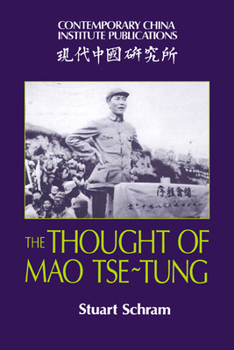The Thought of Mao Tse-Tung
(Part of the Contemporary China Institute Publications Series)
Select Format
Select Condition 
Book Overview
The most general and probably the most lasting expression of Mao Tse-Tung's contribution to the Chinese revolution was his thought. Stuart Schram's new book examines the unfolding of Mao's ideas, and in doing so sheds new light on other aspects of Mao Tse-Tung's life and times. The author traces the stages in the formation of Mao's thought from the May Fourth period through the Peasant Movement, the long years of armed struggle against the Kuomintang...
Format:Paperback
Language:English
ISBN:0521310628
ISBN13:9780521310628
Release Date:July 1989
Publisher:Cambridge University Press
Length:256 Pages
Weight:0.85 lbs.
Dimensions:0.6" x 6.0" x 8.9"
Customer Reviews
1 rating
Insightful summary of Mao's thought
Published by Thriftbooks.com User , 15 years ago
Stuart Schram's 200-ish page monograph on Mao's thought is a summary of the passages on this topic contained in the Cambridge History of China (vols. 13-15), and has been separately published by the Contemporary China Institute of University of London's SOAS. This book is a very information-dense but quite readable overview of Mao's thought in politics, dialectics, economics, strategy and so forth, as it developed from the earliest stages of the May Fourth Movement to the Cultural Revolution. Schram describes objectively and with an eye for subtle details the various stages of development of Mao's thought, including but not limited to his view on the relation between countryside and city, the idea of the 'mass line', his changing views on the principal contradiction in society, the theory of the productive forces, and the attitude towards the Party and its status. Schram shows both Mao's utopian-rebellious and his tempered, imperial aspects, not denigrating either but showing how their constant tension revealed itself in his thought and policy. Most particular these tensions not only appeared in Mao's often changing conceptions of what the true and principal contradictions were, whether "among the people" or "antagonistic", but the rapid back-and-forth in policies itself was a sign of Mao's difficulty in reconciling contrary political ideals. That is not to disparage Mao's achievements, and although this book is about Mao's thought only and does not discuss policy and results in detail unless directly relevant to it, Schram certainly has no intent of holding Mao in contempt or dismissing him as a lunatic, as so many have done. His attitude is rather that of a somewhat disappointed sympathizer. There is not much on the relation of Mao's thought to that of other important people at the time, such as Deng, Liu or Peng, but the conclusion adds some reflections on the new course set out by Deng Xiaoping since he gained power in China (this book having been published in 1989). Schram's open-ended and objective approach and conclusions about Mao make this book an excellent general overview of Mao's intellectual contributions to Marxism and revolution.




